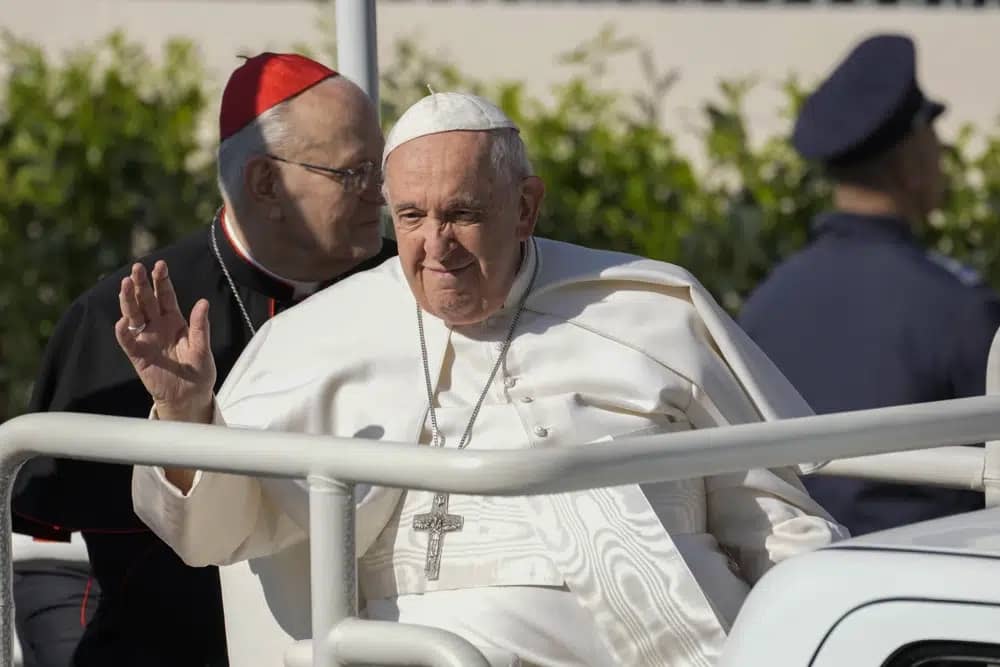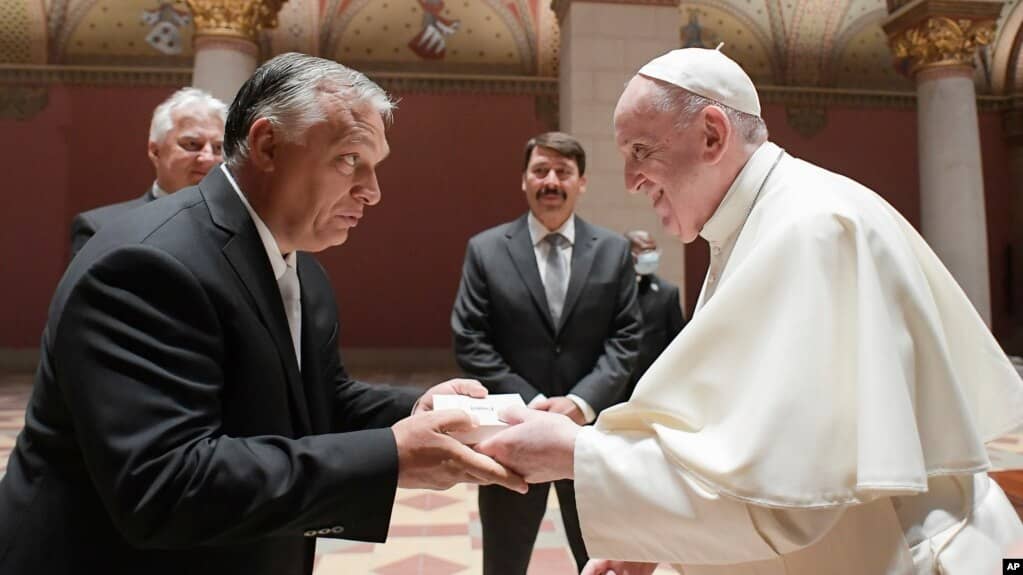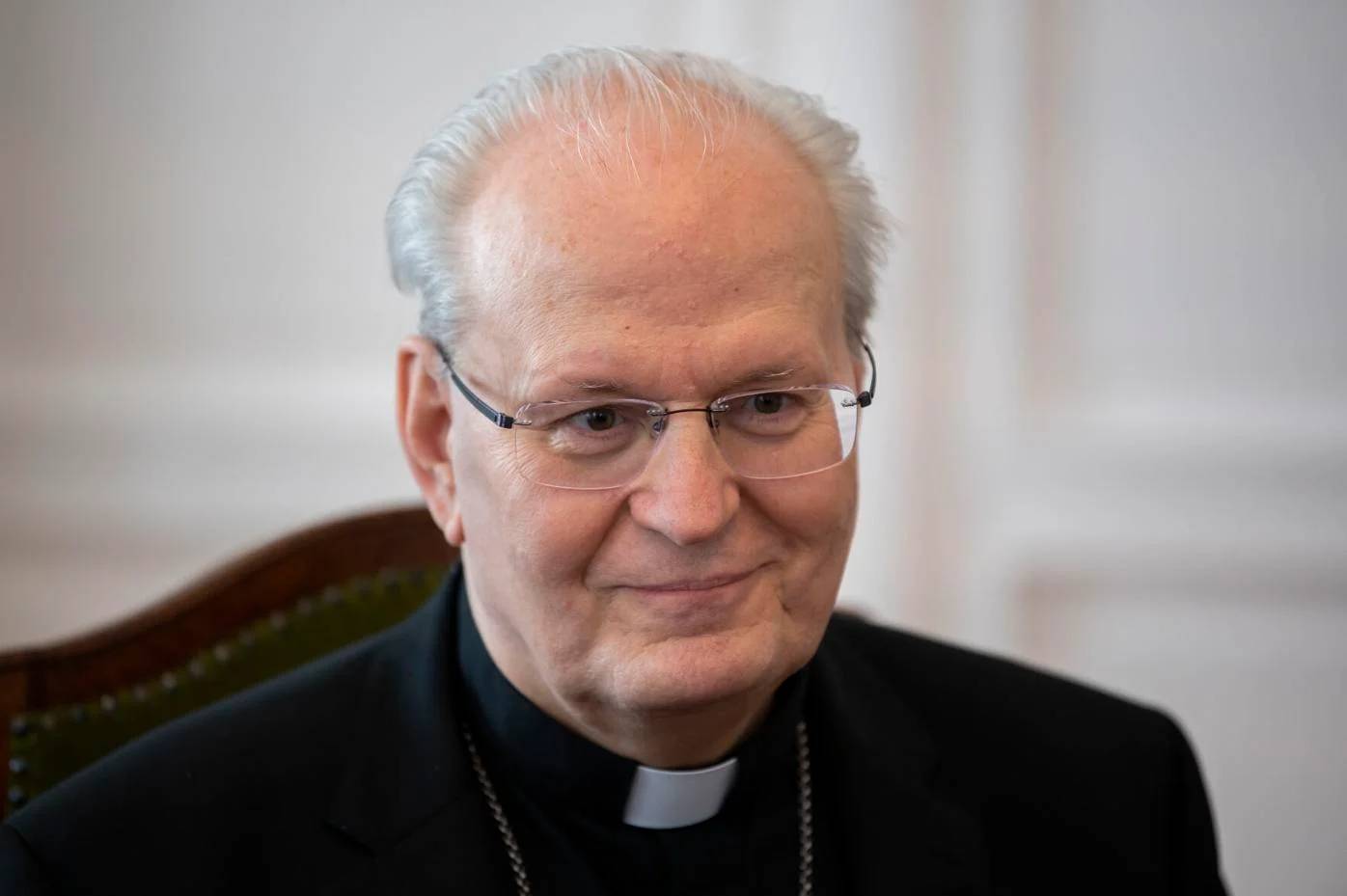ROME – During a brief inflight press conference returning from Budapest to Rome Sunday, Pope Francis spoke of his meeting over the weekend with a prominent Russian Orthodox prelate, saying such encounters are necessary in the peace process.
“I think peace is always made by opening channels, it is never done with closure. I invite all to open strong channels of friendship. This is not easy,” Francis said.
Speaking of his unannounced meeting Saturday afternoon with Russian Orthodox Metropolitan Hilarion of Budapest and Hungary, who until recently served as the Moscow Patriarchate’s foreign minister, the pope said “Hilarion is a person I respect a lot.”
“We have always had a good relationship and he had the courtesy to come visit me, and he was at the Mass. I also saw him at the airport. Hilarion is an intelligent person with whom you can talk,” he said, saying that since the war started he has only spoke with Russian Patriarch Kirill once via a video call at the beginning of the war for 40-minute conversation.
Francis said there is now engagement with Metropolitan Anthony of Volokolamsk, who took Hilarion’s position as the Moscow Patriarchate’s foreign minister last year. Hilarion’s ouster was interpreted by many observers as a sign of diverging opinions on Russia’s invasion of Ukraine, which has been vocally supported by Russian Orthodox Patriarch Kirill.
Metropolitan Anthony was once the pastor of the Russian Orthodox community in Rome, and Francis said that “through him, I am in touch with Kirill.”
He noted that a second meeting with Kirill, whom he met for the first time in Havana in 2016, was scheduled to take place in Jerusalem last summer, but was cancelled due to the public backlash it was likely to create in light of Kirill’s support for the Ukraine war.
The pope said he also has a good relationship with the Russian ambassador to the Holy See, Aleksandr Avdeyev, calling him “a serious, welcoming, balanced person.”
During the meeting with Hilarion Saturday, Pope Francis said the two spoke about “the path to peace,” and though he did not go into details, said that “right now a mission is underway,” the details of which are not yet public, but should be published soon.
Francis met Hilarion shortly after meeting with poor people and refugees, including several Ukrainian refugees who had fled the war.
The Vatican described their 20-minute conversation as “cordial,” with a statement from Hilarion’s office saying he told the pope about the life and social and educational activities of the Russian Orthodox diocese of Budapest, and its interaction with the Catholic Archdiocese of Esztergom-Budapest and other Christian denominations.
Asked whether anything was being organized between Russian and Ukrainian youth for the International World Youth Day event set to take place in Portugal Aug. 1-6, Francis said that while he did not know the details, “something is being planned.”
He was also asked whether the Holy See would be able to assist in the return of Ukrainian children deported to Russia, saying “I think so,” and noting that the Vatican in the past has assisted in the negotiation of prisoner exchanges.
“I think we can help, we are willing to do so, and we must help,” he said, saying gestures of humanity are essential in times of war.
“All gestures of humanity help, but gestures of cruelty don’t help. We must do everything humanly possible,” he said, and urged those who work with refugees not to lose their enthusiasm for doing so, because there are women and children who otherwise “remain without protection” and risk falling prey to traffickers.
Pope Francis spoke to journalists on his return flight from Budapest to Rome, having spent three days in the Hungarian capital meeting with national authorities, refugees, and the local Catholic community.
During a roughly 20-minute inflight press conference, the pope also spoke about his experience of Hungary, his recent health scare and hospital stay, and upcoming travel plans.
In terms of his health, the pope referred to his brief hospital stay at the end of March for bronchitis, saying he felt “a strong malaise” at the end of his weekly general audience the day he was admitted and went to lie down, as he did not feel like eating lunch.
Referring to rumors saying that, despite an initial Vatican statement saying he had gone in for “pre-planned tests,” he had been rushed to the hospital in an ambulance after losing consciousness, Francis said that “I didn’t pass out, but I had a very high fever, and at 3:00 in the afternoon the doctor immediately brought me to the hospital.”
“It was a very strong pulmonary infection. Thank God I am here to tell you about it! My body responded well to the treatment, thank God,” he said.
Asked whether he thought he would be able to make his trip to Lisbon for World Youth Day, the pope said, “I hope to be able to do it,” and that while he is “not the same as a few years ago,” for the time being, the trip “has not been cancelled.”
He said he still has plans to visit Marseille and Mongolia in September, adding that the schedule “will make me move!”
Pope Francis was also asked about his meeting with Hungarian Prime Minister Viktor Orban and his strong words in his opening speech Friday on the need to be welcoming of migrants, an issue on which the pope and Orban have often butted heads.
In his remarks, the pope said migration is “a problem that Europe must take in hand,” and noted that Italy, Cyprus, Greece, Malta, and Spain are the countries “who suffer most” given their access to the Mediterranean.
He advocated for “a more equal distribution of migrants” throughout Europe, but he also suggested, as he has in the past, that migrants could be a solution to the declining birth rates throughout Europe.
Currently in Italy, the average age of the population is 46, and in Spain it is higher, he said, adding, “migration can also help these countries which have low birth rates.”
Francis also touched on his recent decision to return fragments of sculptures from the Parthenon, which were pillaged and have been part of the Vatican Museums’ permanent collection for the past 200 years.
The fragments, which date back some 2,500 years and show the heads of a horse, a bearded man and a boy, were definitively transferred to Athens March 24.
Asked whether he planned to make similar acts of restitution given the pressures now on the Holy See to return other artifacts taken during the colonialist era, specifically indigenous artifacts from Canada, Pope Francis pointed to the commandment, “Thou shalt not steal,” saying, “If you steal you have to return!”
Returning the Parthenon fragments “was the right gesture, it needed to be done,” he said, but cautioned that every case is different and requires discernment.
“If tomorrow the Egyptians come to ask for the obelisk, what do we do? There is discernment in every case,” he said, saying discussions are already underway regarding the indigenous artifacts from Canada, where he visited last year and issued an historic apology for the Catholic Church’s role in the abuse of children as part of the country’s residential school system.
“My experience with the indigenous was very fruitful,” he said, saying that when it comes to the issue of restitution, “in the measure in which we can restore, we should.”














